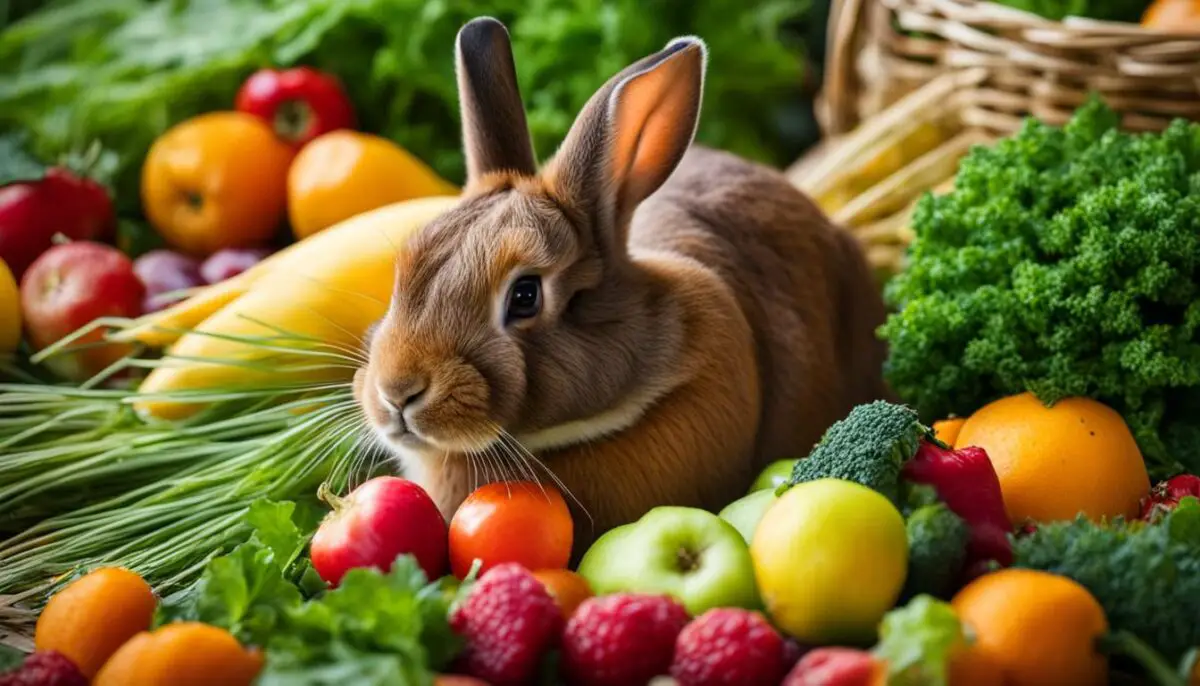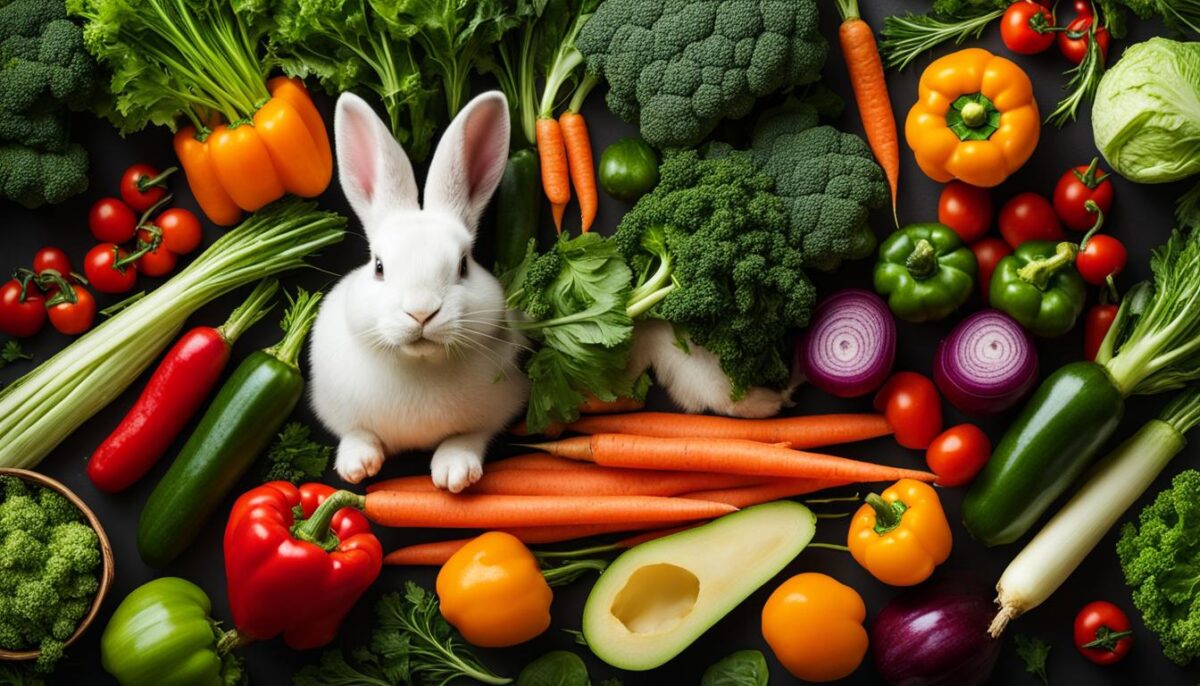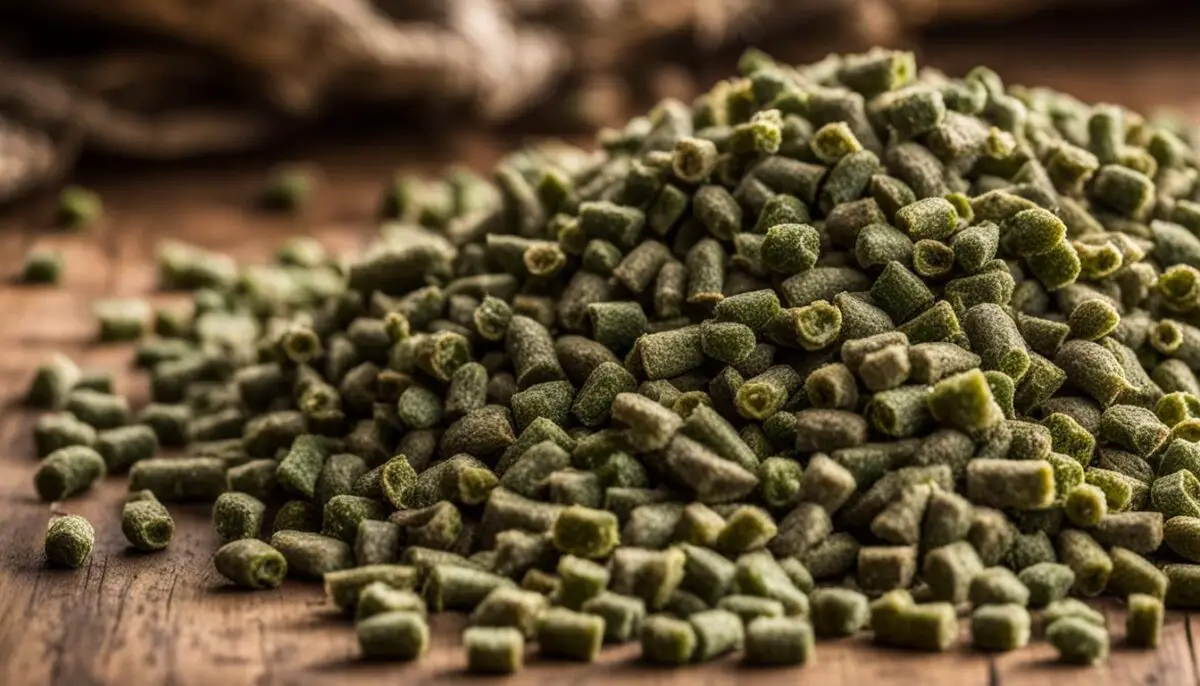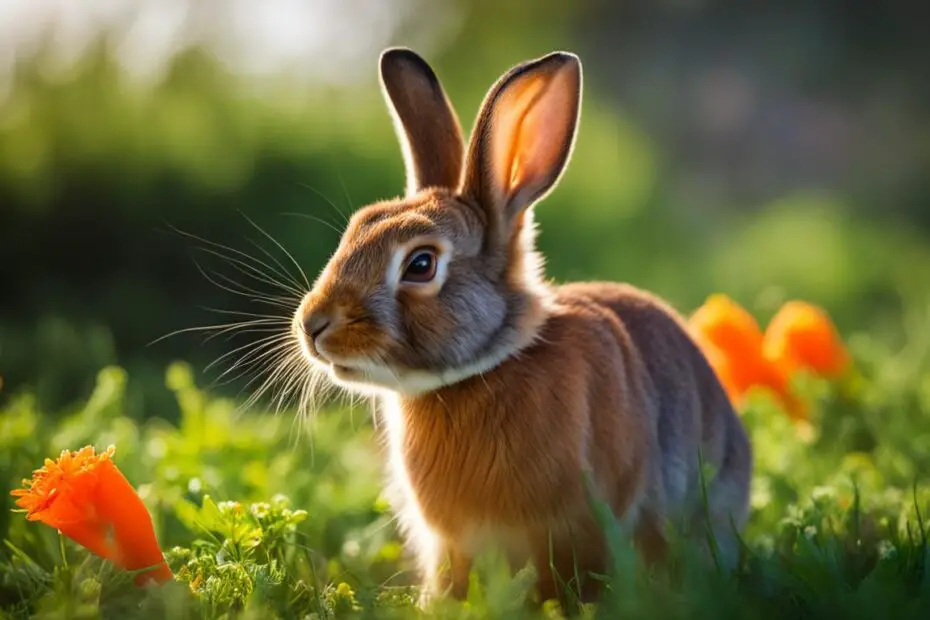When it comes to rabbits, providing them with the right daily diet is essential for their overall health and well-being. Many people believe that carrots are the go-to food for rabbits, but in reality, carrots should only be given as an occasional treat due to their high sugar content. So, what should rabbits eat every day to stay happy and healthy?
A healthy diet for rabbits primarily consists of three main components: hay, leafy greens, and pellets. Hay should make up the majority of their diet, as it is an excellent source of fiber and helps maintain good digestive health. Leafy greens, such as arugula, celery leaves, and fennel, provide important nutrients while adding variety to a rabbit’s daily meals. Pellets, which should be made with timothy hay as the main ingredient, can be given in smaller portions to supplement their diet.
It’s important to note that fruits and vegetables should be given in moderation, as some can be high in sugar or contain nutrients that may be harmful to rabbits when consumed in excess. Clean drinking water should always be available to keep rabbits hydrated and support their overall well-being.
Key Takeaways:
- Carrots should only be given as occasional treats due to their high sugar content.
- A rabbit’s daily diet should consist mainly of hay, with a serving of leafy greens and a small portion of pellets.
- Some safe vegetables for rabbits include arugula, celery leaves, and fennel.
- Pellets with timothy hay as the main ingredient are recommended for rabbits.
- Fruits and vegetables should be given as occasional snacks, while clean drinking water should be provided at all times.
The Importance of Hay in a Rabbit’s Diet
When it comes to a rabbit’s diet, hay plays a crucial role in keeping them healthy and thriving. Hay is not just a simple food source; it provides essential fiber that aids in regulating a rabbit’s digestive system. This fiber intake is vital for maintaining a healthy gut and preventing gastrointestinal issues.
In addition to promoting good digestive health, hay also plays a significant role in maintaining a rabbit’s dental health. A rabbit’s teeth grow continuously, and chewing on hay helps wear down their teeth, preventing overgrowth and dental problems.
There are different types of hay available, but timothy hay is highly recommended for a rabbit’s diet due to its high fiber content. Other options such as meadow hay, oat hay, and orchard grass can also be included but should be given in smaller quantities.
Feeding rabbits a diet rich in hay ensures that they receive the necessary fiber intake for optimal health. It keeps their digestive system functioning smoothly, prevents gastrointestinal issues, and supports dental health.
Types of Hay for Rabbits
There are various types of hay suitable for rabbits, each with its own characteristics and benefits:
- Timothy Hay: Timothy hay is the most commonly recommended hay for rabbits. It has a high fiber content and is low in calcium and protein, making it an ideal choice for regular consumption.
- Meadow Hay: Meadow hay is a mix of grasses, herbs, and wildflowers. It offers variety in taste and texture, adding enrichment to a rabbit’s diet.
- Oat Hay: Oat hay is rich in fiber and low in calories, making it a good option for rabbits with weight management concerns.
- Orchard Grass: Orchard grass is similar to timothy hay but has a sweeter taste. It can be a good alternative for picky eaters.

Fresh Foods for Rabbits
In addition to hay, rabbits should be given a daily serving of fresh leafy green vegetables to ensure a balanced diet. These fresh foods provide important nutrients that support the overall health and well-being of rabbits.
Safe Vegetables for Rabbits
When selecting vegetables for your rabbit, it’s important to choose safe options that are low in sugar and high in fiber. Some safe vegetables for rabbits include:
- Arugula
- Celery leaves
- Chicory
- Dandelion greens
- Fennel
These vegetables are not only nutritious but also provide variety and texture to your rabbit’s diet.
Safe Herbs for Rabbits
Herbs are a great way to add flavor and variety to your rabbit’s meals. Some safe herbs for rabbits include:
- Basil
- Cilantro
- Mint
- Parsley
- Thyme
These herbs can be added to your rabbit’s vegetables or hay to make meals more interesting and enjoyable.
Toxic Foods for Rabbits
While there are many fresh foods that are safe for rabbits, there are also some that can be toxic and should be avoided. These include:
- Avocados
- Onions
- Mushrooms
- Tomato leaves
It’s important to be cautious and avoid giving your rabbit these toxic foods to prevent any potential health issues.
Fruit and Veggie Treats for Rabbits
While fruits and vegetables should primarily be given in small amounts as part of a balanced diet, they can also be used as occasional treats for rabbits. Some safe fruit and veggie treats for rabbits include:
- Apples
- Apricots
- Bananas
- Carrots
Remember to cut these treats into small pieces to prevent choking and only offer them in moderation to avoid any digestive issues.

Safe Vegetables and Herbs for Rabbits
| Safe Vegetables | Safe Herbs |
|---|---|
| Arugula | Basil |
| Celery leaves | Cilantro |
| Chicory | Mint |
| Dandelion greens | Parsley |
| Fennel | Thyme |
How to Feed Rabbit Pellets
Rabbit pellets are an important part of a rabbit’s diet, but it’s essential to feed them properly to ensure your furry friend stays healthy and happy. Here are some key tips for feeding rabbit pellets:
- Choose the Right Type: When selecting rabbit pellets, opt for ones that include timothy hay as the main ingredient. Timothy hay is rich in fiber, which aids in digestion and keeps your rabbit’s gut healthy.
- Proper Portion Size: Rabbit pellets should only make up a small portion of your rabbit’s daily diet. The recommended amount is 2-5 tablespoons per day, depending on the size of your rabbit. Avoid overfeeding pellets as they can lead to obesity and other health issues.
- Supplement with Hay: While pellets are important, they should never replace the primary source of a rabbit’s diet—hay. Make sure your rabbit has access to fresh, high-quality hay at all times. This helps maintain their dental health and provides the necessary fiber for proper digestion.
- Importance of Water: Water is crucial for a rabbit’s overall well-being. Ensure that your rabbit always has access to fresh and clean drinking water. Some rabbits prefer water bowls, while others prefer sipper bottles. Monitor the water level regularly and refill as needed.
Feeding your rabbit pellets should always be accompanied by an adequate supply of fresh hay and water. These three components work together to create a balanced and nutritious diet. Remember to monitor your rabbit’s weight and overall health regularly to ensure they are receiving the appropriate amount of food and experiencing optimal well-being.
| Type of Rabbit Pellets | Key Features |
|---|---|
| Pellets with Timothy Hay | High in fiber and essential nutrients |
| Alfalfa-Based Pellets | Higher in protein, suitable for growing rabbits or pregnant/nursing rabbits |
| Variety Blend Pellets | Mix of different types of pellets to provide a balanced diet |
Remember, while pellets are part of a rabbit’s diet, they should be fed in moderation. Hay and water should always be the main focus, providing the majority of their nutrients. By following these feeding guidelines, you can ensure that your rabbit receives a well-rounded diet that contributes to their overall health and happiness.

Treats for Rabbits
Treats can be a wonderful way to bond with your rabbits and provide them with mental stimulation. However, it’s essential to choose treats carefully and offer them sparingly to prevent weight gain and potential health issues. So, what are the recommended treats for your furry friends?
Small pieces of fresh fruit and vegetables make excellent treats for rabbits. They are packed with vitamins and minerals, adding variety to their diet. Some suitable options include:
- Apples
- Pears
- Berries
- Carrots
- Cucumbers
When offering treats, make sure to cut them into bite-sized chunks to make it easier for your rabbits to eat. Remember, treats should only be given occasionally and in small amounts. Moderation is key to maintaining a healthy diet for your rabbits.
The Importance of Balanced Treats
While it can be tempting to spoil your rabbits with treats, it’s important to strike a balance. Overindulging in sugary or high-calorie treats can lead to obesity and other health issues. Always prioritize their primary diet of hay, leafy greens, and pellets.
“Treats should be an addition to a rabbit’s diet, not a replacement for their staple foods.”
Remember to monitor your rabbits’ weight and adjust their treat portions accordingly. Your veterinarian can provide guidance on the appropriate treat amounts based on your rabbits’ specific needs.
| Treats for Rabbits | Frequency | Serving Size |
|---|---|---|
| Apples | Occasional | Small chunks |
| Pears | Occasional | Small chunks |
| Berries | Occasional | A few pieces |
| Carrots | Occasional | Small pieces |
| Cucumbers | Occasional | Small slices |
Conclusion
Maintaining a healthy daily diet is essential for the well-being of rabbits. By following a few simple guidelines, you can help ensure that your furry friend receives the nutrition they need to thrive.
The daily diet for rabbits should consist primarily of hay, which provides essential fiber and helps regulate their digestive system. Leafy green vegetables should also be a part of their daily meals to provide a balanced nutrition. Pellets can be included in small portions to ensure they receive necessary nutrients.
Additionally, fresh fruits and vegetables can be given as occasional treats to add variety and mental stimulation. However, it’s important to choose treats wisely and not overdo it to prevent weight gain and health issues. Lastly, access to clean drinking water is crucial for a rabbit’s daily diet.
By providing a balanced and nutritious daily diet, you can ensure that your rabbits are happy and healthy pets, living their best lives.
FAQ
What should rabbits eat daily?
Rabbits should primarily eat hay, along with a daily serving of fresh leafy greens and a small portion of pellets. Fruits and vegetables can be given as occasional treats.
Why is hay important in a rabbit’s diet?
Hay provides essential fiber for rabbits and helps regulate their digestive system. It also promotes good dental health by engaging their teeth and preventing overgrowth.
What are safe vegetables and herbs for rabbits?
Safe vegetables for rabbits include arugula, celery leaves, chicory, dandelion greens, fennel, and more. Safe herbs for rabbits include basil, cilantro, mint, parsley, and thyme.
What should be the portion of rabbit pellets in their daily diet?
Rabbit pellets should make up a small portion of a rabbit’s daily diet, approximately 2-5 tablespoons per day depending on the rabbit’s size. Choose pellets with timothy hay as the main ingredient.
How important is water in a rabbit’s daily diet?
Water is crucial for rabbits’ daily diet, and fresh, clean drinking water should be accessible at all times. Some rabbits prefer water bowls, while others prefer sipper bottles.
What are the recommended treats for rabbits?
Small pieces of fresh fruit and vegetables, such as apples, pears, berries, carrots, and cucumbers, can be given as treats. Cut them into bite-sized chunks and give them sparingly.
What is the importance of maintaining a healthy daily diet for rabbits?
A balanced and nutritious daily diet will ensure that rabbits are happy and healthy pets, preventing potential health issues and promoting overall well-being.


